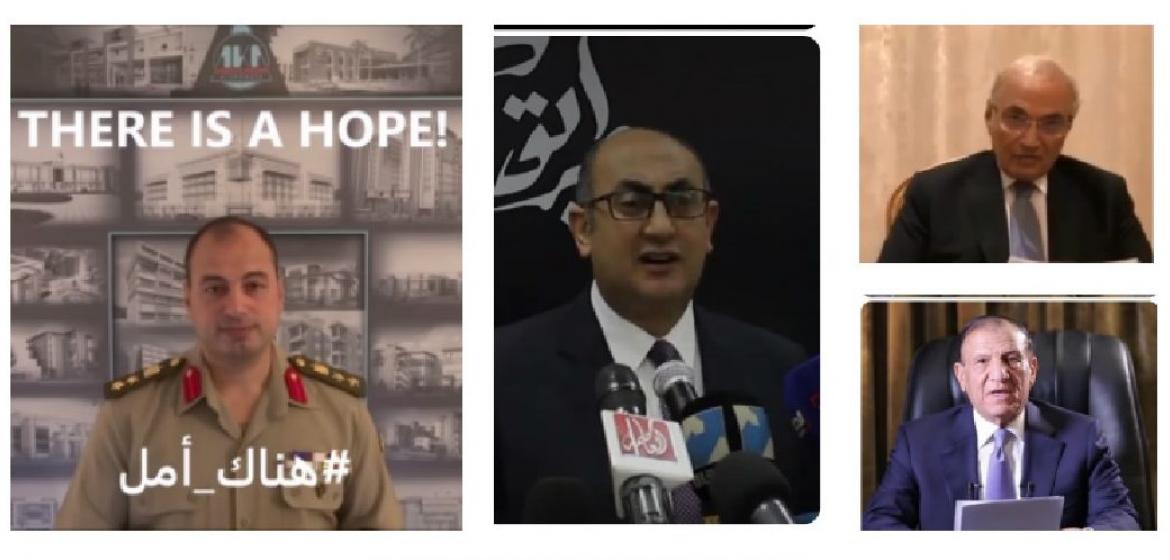Egypt is to vote for a president starting this Monday. But all serious opposition candidates have quit the race way before it started, some under suspicious circumstances.
The Egyptian presidential race caused lots of controversies before it had even started. According to the official timeline, presented on January 8 by the Egyptian National Electoral Commission (NEC), the voting is scheduled to take place between March 26 and 28. On February 24, the ENC announced furthermore that the Egyptian presidential race will consist of two candidates only: Abdel-Fattah Al-Sisi and Moussa Mostafa Moussa, who only last year had founded a campaign to collect votes for Al-Sisi's 2018 presidential elections.
Fast moving and unexpected twists put the supposedly routine race under the spotlight of both local and international media. The main question was not who is going to win, but rather who would even be able to enter the race. The road to the presidential palace took dangerous detours for almost all serious candidates: one went missing for a day, two ended up in military prison, and one dropped out of the race while still awaiting a final verdict on the “public indecency” case filed against him.
Where is Ahmed Shafik?
This question was the talk of social media and news outlets on December 3. Shafik, the former air force commander and the last Prime Minister to be appointed by Hosni Mubarak, went missing after he was deported from the United Arab Emirates (UAE) to Egypt on a private jet. Back in March 2011, Shafik was pressured to resign as Prime Minister because demonstrators perceived him to be a face of Mubarak’s regime. He returned to the political scene in 2012 as one of the candidates in the first presidential elections after the revolution.
After narrowly losing to Mohammed Morsi, he fled to the UAE as the corruption cases filed against him started to move quickly. Although these cases ended in acquittal or were dropped and Shafik’s name was removed from the Egyptian airports watch list, he still did not return to Egypt. He even formed a political party, the Egyptian Patriotic Movement, which he led remotely from the UAE. The party managed to win only four out of 568 seats in the 2015 parliamentary elections.
On November 29, not only one but two videos brought the ex-Prime Minister back in the spotlight. The first was published on his official YouTube channel. “I strongly believe that any success, small or big, won’t be achieved in our country unless we establish a civil, democratic and stable regime that is subject to review and criticism … Real democracy and human rights are not granted or applied gradually,” said the 76 years old former air force commander, criticizing the current economic and political situation. He also announced his determination to run for the presidency and talked about how bringing new minds to the scene is the way for growth and development.
Shortly thereafter, a controversial video was aired exclusively on the Qatari Al-Jazeera channel. In it, Shafik accused the UAE of banning him from travelling. “I reject the intervention in Egypt’s affairs and the obstruction of my constitutional right … I promise you, fellow citizens, that I will not back down from my duty,” he added. The video caused fury not only in the Egyptian media but also among UAE officials, especially under the tense Qatar-UAE relationship. UAE’s Minister of State for Foreign Affairs, Anwar Gargash, denied Shafik’s allegations on his official Twitter account and added: “[Shafik] took refuge in the UAE escaping from Egypt … we hosted him despite having strong reservations about some of his positions.”
Even members of Shafik’s party condemned his actions: “I have previously announced my personal support to president Al-Sisi … I don’t mind if anyone else runs against him. My only objection is that Shafik announced his candidacy on Al-Jazeera,” stated parliament member Mostafa Abou Zid on Mehwar TV-Channel, declaring his resignation from the Egyptian Patriotic Movement. Although Shafik’s plan was to travel abroad first, he was deported by the UAE to Egypt on December 2. On that night, his family and his lawyer confirmed to various media outlets that Shafik’s whereabouts were unknown to them and they have not been able to reach him since he left the UAE.
After about 24 hours of speculations, the former aviation minister finally resurfaced in a phone call to the Egyptian privately owned Dream TV-channel. He denied all allegations of being kidnapped or held under investigation: “I was very well received [at Cairo airport] … I was planning, anyway, to stay in a hotel. My house here has been closed for about six years now and needs to be cleaned … I was surprised that I was driven to one of the best hotels in the neighborhood I live in.” During the phone call, Shafik claimed that the video, aired on Al-Jazeera, was leaked from his mobile phone without his consent. He stated that it was not supposed to be published and was only filmed as a precaution in case things escalated.
The next day, Reuters published an article declaring that the former Prime Minister is not “entirely free” in his stay in “a Marriott Hotel in a Cairo suburb”. His hotel reservation “had been made by Egypt’s armed forces,” according to Reuters. The article also mentions that Shafik was accompanied by “men in civilian clothes who refused to let a Reuters reporter talk to him and quickly sent the reporter away.”
“I think I will not be the ideal person to lead the country during the upcoming phase,” declared Shafik on January 7 to announce his withdrawal from the presidential race. He also added, in a statement on Facebook, that his absence for more than five years may have distanced him from “closely following what has been going on in the country, all the developments and achievements accomplished in spite of the difficult circumstances.”
There is hope
This is the slogan Colonel Ahmed Konsowa chose for his campaign - which was cut short as he was called in for interrogation by the military prosecution only two days after announcing his intention to run in the upcoming elections. “If we had an alternative, no one would have dared to challenge the constitution, the rules of justice and the alternation and separation of powers. Who is the alternative? I am.”
With this statement, Konsowa opened his candidacy video, published online on November 29 (full speech in Arabic and English). The 42 years old architect and military officer was unknown to the public before his video started circulating on social media platforms. In the video, he explains that since March 2014 - "two days after and as a result of the current president's announcement of his candidacy" - Konsowa was trying to resign from his military post, a necessary prerequisite to becoming politically active in Egypt.
Until now, Konsowa's resignation has not been accepted, though he has filed eleven lawsuits against the president, the prime minister, the defence minister and the speaker of Parliament among others.
Konsowa criticizes both the current political and economic situation in his speech: “No, they will not succeed in burying our dreams of justice and freedom … How could we expect our enemies to give us an ideal election atmosphere … By participating, uniting, pushing and monitoring we could decrease any chances of fraud.” He also speaks about the inflation and the rapid increase in prices that Egypt has been facing for the past couple of years. To publicly express political views while still serving in the army is considered a violation of Egyptian military rules.
“To those who would criticize me for making this announcement while wearing the uniform … Firstly, I’m not the only one to do this. So you should ask those who previously did the same,” justifies Konsowa himself, in a clear reference to Al-Sisi who announced his candidacy in 2014 while also wearing his military uniform. “Secondly, I am not allowed to take it off, despite my numerous attempts. Thirdly, I’m not a rebel or a dissident or disobeying military orders. On the contrary, I’m proud of my job.”
On December 19, Mohamed Konsowa was sentenced to six years in military prison for “expressing political opinions as a serving officer”, as per his lawyer’s statement to Reuters. “I feel sorry for my family and loved ones who will definitely get anxious watching this speech ... I also want to apologize to them in case this announcement caused them any trouble later on. My excuse is wanting a better future for all of our children,” said the Colonel in his video, as if predicting his own fate. “I don’t ask you to defend me, but defend yourselves, the future of your country and your right to choose.” Konsowa’s appeal was rejected on January 29, according to his lawyer Asaad Heikal.
From SCAF to military prison
Another hopeful candidate having ended up in military prison is Sami Enan, a former member of the Supreme Council of the Armed Forces (SCAF). The SCAF was handed the power to govern Egypt after the pressured resignation of Mubarak in February 2011. Former president Morsi announced the retirement of both Sami Enan and Mohamed Hussein Tantawi, at the time defence minister, in 2012.
Tantawi was succeeded by Abdel Fattah Al-Sisi, the current president of Egypt. On January 19, the 70-year-old Enan announced in an online video his intention to submit his candidacy papers to the NEC, after “completing the required procedures, as a former chief of staff in the Egyptian army, in accordance to the laws and rules of the military”. He criticizes the Egyptian state’s role in handling serious issues such as “land and water”, thereby referring to the controversial cases of the Red-Sea islands of Tiran and Sanafir and the Grand Ethiopian Renaissance Dam. “I am asking all state institutions, civil and military, to take a neutral stance towards all candidates and not to be unconstitutionally biased in favor of a president that might leave his office in the upcoming few months. He is now just a probable candidate among others,” he added.
The former general’s declaration came just hours after Al-Sisi had confirmed his candidacy. In the video, Enan also emphasizes the importance of empowering the civil arms of the state instead of solely relying on the military. For this purpose, he announces that he has appointed two civilian vice presidents: Hazem Hosny, Professor of Political Sciences at Cairo University, and Hisham Geneina, former head of Egypt’s Central Auditing Authority (CAA). In 2016, Geneina was relieved of his duties by a presidential decree. Furthermore, he was sentenced to a suspended one-year prison term for “spreading false news” after giving an “inaccurate” statement to the media about the size of governmental corruption in Egypt.
On January 27, Geneina was attacked by three men near his home. His family stated that this assault with knives was a kidnap/murder attempt to prevent him from going to the NEC to appeal the ban which was imposed on Enan to participate in the elections. Later, the police declared that the incident was a fight ignited by a car accident. The three men also made counter allegations of assault against Geneina, his driver and his family. The case is still under investigation.
On January 23, the Egyptian state television aired an official statement of the general military command accusing Enan of breaking the rules and regulations of the army. Firstly, by “announcing his candidacy without obtaining the approval of the armed forces or taking the necessary procedures to terminate his service in the army”. Secondly, by “making clear incitement against the armed forces in his video”. Thirdly, by “forging official documents stating he was no longer serving in the military”.
Soon after, it was announced that the retired general had already been detained and taken to the military prosecutor's office. On the same day, a media gag order was imposed on Enan’s case. After giving an interview to HuffPost Arabi, Geneina was also arrested and referred to military prosecution on February 13. He claimed that Enan was keeping “confidential documents about the political crimes that took place since the revolution in 2011”. Nasser Amin, Enan’s lawyer, and Samir Enan, his son, denied Geneina’s allegations completely. The journalist who conducted the interview, Moataz Wadnan, was also arrested on charges of “joining an illegal group” and “publishing false news”.
One candidate left
Khaled Ali, the 46 years old leftist lawyer, was known mostly inside the circles of activists and supporters of the revolution. He came more under the spotlight after heading the high-profile legal battle against the Egyptian government to annul the controversial 2016 maritime border agreement that stipulates the transfer of the Red-Sea islands of Tiran and Sanafir to Saudi Arabia. It brought him lots of media attention that did not run short on negative propaganda. Fame, however, was not the only issue the former 2012 presidential hopeful had to face.
On September 25, Ali was convicted of “offending public decency” and sentenced to three months in prison. The accusation was based on a video, initially broadcasted on privately owned Sada El Balad TV-channel, showing Ali allegedly making an obscene hand gesture while celebrating the Supreme Administrative Court’s rule in his favor. The human rights lawyer appealed, claiming that the video was edited and manipulated.
On March 7, the appeal hearing was adjourned to June 6. “We are preparing for the elections with no delusions about our rival’s integrity or the fairness of the circumstances in which the current elections are taking place,” Ali said during a press conference on November 6. He announced his candidacy despite the probability of being disqualified from the race in case his appeal got rejected.
In his speech, Ali stresses that he would never be a part of a political distraction: “We will fight, along with all the other political forces, to obtain real guarantees to open up the public space and extend it.” Earlier that day, according to Ali, security forces had raided the printing house which produces flyers and other documents for his press conference. According to Middle East News Agency, a “high ranking security source” denied the whole incident. Ali ended the conference declaring that his decision to run was not final: “Along with all the other Egyptian political forces, we will fight to unite our position in the upcoming elections. Either we will all participate together or we will boycott, leaving Abdel Fatah Al-Sisi as a sole candidate in the elections.”
On January 24, Ali then finally announced his withdrawal during a press conference: “The development that the election process has witnessed so far sent a message to everybody that the small window of opportunity has been closed ... Today, we announce our decision not to take part and not to submit our candidacy papers in a race that we think is already finished before it has even started.” His decision came in response to the plea of many of his supporters to abandon the race after Enan had been arrested, which left Ali as the last challenger to the current president.
On the eve of the elections, Al-Sisi and Moussa Mostafa Moussa remain the only two candidates. For Mohamed Abu Shoka, spokesman of Al-Sisi's official election campaign, the reasons for this are clear: “Those who have not been able to present any candidates [to the political scene] for years or those who always announce their intention to run, then withdraw and blame others for their failure are the ones who should be asked about this situation,” Abu Shoka, declared on CBC TV-channel. “People are asking me, as if [Al-Sisi] is obliged to bring candidates to compete against him in the elections! The political space is open!”
Name of the author altered due to security concerns




















